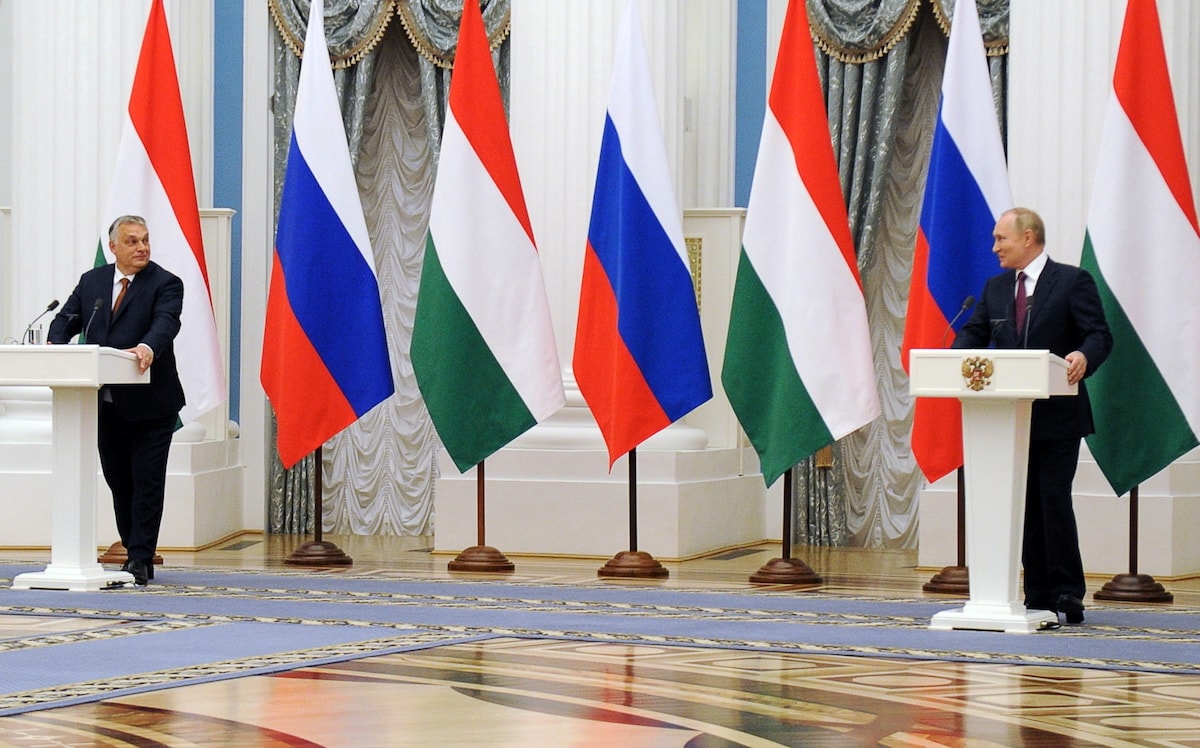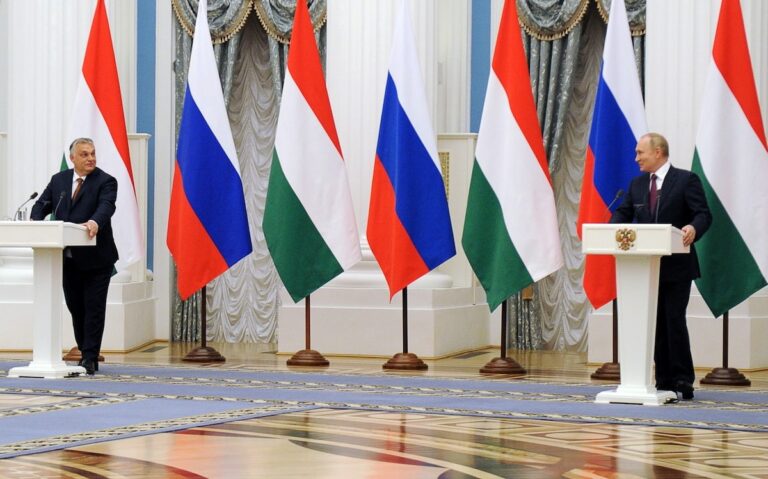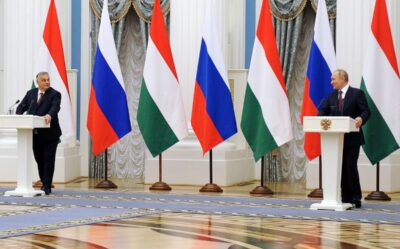by Lóránt Győri, Political Capital
After years of trying to appease the Kremlin for the sake of “big” business deals, such as the construction of the Paks-II nuclear power plant built by Rosatom, the fifth day of the Russian invasion against Ukraine forced a stunning Hungarian diplomatic turnabout. Faced with diplomatic pressure and isolation from even its closest allies, such as Poland, PM Orbán unequivocally condemned the Russian attack against Ukraine, approved the European sanctions against the Kremlin and expressed support for Ukraine’s EU membership.
The so-called “Eastern Opening” foreign policy of Hungary is dead at the hands of Vladimir Putin. The distinct foreign policy path was announced by the Hungarian MFA in 2012 to pursue a multivector diplomatic and economic foreign approach based mainly on the economic interests of Hungary – trying to secure investments from the East and the West at the same time, regardless of the diplomatic and cultural “values” attributed to Hungary’s Western alliances. The “Eastern Opening” was also, as we now know, a failed attempt on the part of the Hungarian Prime Minister Viktor Orbán to reorient the traditional Hungarian path of economic, social and political modernisation by looking to the East in the 21st Century.
While the East-Asian region, mainly China, South Korea, Japan, Taiwan, has become indeed one of the new world centres of industrial and technological modernisation, the Hungarian approach mainly relied on the appeasement of two big powers, Russia, and China, which was doomed to fail. One of the reasons for that was Russia itself, a prime example of an autocratic kleptocracy presiding over a small economy based mainly on the export of raw materials instead of state of the art industrial or technological capacities. When it comes to China, the world’s economic and industrial powerhouse, Hungary proved to be too small of a market to become a significant economic partner, meaning that most of the Hungarian trade with China is conducted through German multinational manufacturers, such as the Volkswagen Group, and there is also a clear lack of scalable infrastructural development opportunities in Hungary for Chinese businesses. As a result, Hungary could secure only a minimal amount of lucrative deals – such as the construction of the Paks-II nuclear reactors financed by a Russian credit line of at least 10 billion euros, or the Belgrade-Budapest railway line for Chinese freight transports built by the Chinese for at least 4.7 billion euros – while the trade volume between Hungary and the two Eastern powers have stagnated or even declined overall in the past 12 years.
What the Hungarian government could really offer in return for the Chinese and Russian diplomatic support and some of these business deals favouring governmental oligarchs was increased vulnerability, starting with the Hungarian public sphere and ending with national security issues. Examples of vulnerability include Huawei’s technology, banned by many allies on national security grounds, that is used to develop parts of the Hungarian 5G network, or the Hungarian-financed establishment of the first European campus of Shanghai’s Fudan University in Budapest, a recruitment pool for both the Chinese state party and intelligence services. The Hungarian government has also supported the establishment of the first European headquarter of the Kremlin’s “spy bank, ”the International Investment Bank in Budapest, alongside special immunities granted by the Hungarian National Assembly.
Business as usual on the brink of war
The last bilateral meeting between Prime Minister Orbán and President Putin, at first, looked like it would fit nicely into the Hungarian Eastern foreign policy. The Hungarian Prime Minister could demonstrate the Hungarian government’s relevance on the world stage before the Hungarian general elections to be held in April 2022, while also showcasing the Kremlin’s tangible support in keeping one of Fidesz’s central campaign promises: sustaining a long-term “utility costs reduction” for households thanks to the long-term Hungarian-Russian gas contract.
Still, the Kremlin’s aggressive posture and rhetoric towards Ukraine, the West, and NATO forced PM Orbán and the Hungarian diplomacy to reframe the meeting, making it look like as if it was originally intended to be “peace mission,” even if there was no mediation occurring on either side of the aisle.
The pro-Russian “neutrality” of Hungary
Right until the launch of the full-scale Russian invasion against Ukraine on the 24th, the Hungarian government and MFA did not officially react to the escalation happening on the ground. PM Orbán continued to condemn the use of sanctions against Russia, while FM Péter Szijjártó blocked Ukraine from joining the NATO Cooperative Cyber Defence Centre of Excellence (CCDCOE), citing the Hungarian-Ukrainian disputes over the human rights of the Hungarian minority living in Transcarpathia. The Hungarian government’s misjudgement and unpreparedness was on display during the last major fraction meeting of the Fidesz-KDNP on the 17th of February, during which PM Orbán did not consider at all the war as one of the major foreign policy risks for Hungary and the region in the foreseeable future. On the first day of the invasion, however, the Hungarian Prime Minister started to correct Hungary’s stance by “condemning Russia’s military action together with Hungary’s European and NATO allies,” while walking a fine diplomatic line by fiercely opposing any Hungarian role in the military conflict in “defence of the Hungarian interests,” and denouncing the opposition as “warmongers” for demanding greater, including military aid for Ukraine. The pro-government media empire also reflected the Hungarian pro-Russian “neutrality” stance by providing both an objective and factual “live coverage” of the war, and opinion pieces echoing the Kremlin’s false narratives used to legitimise the military aggression. Such examples included experts on the main state-owned M1 channel stressing that Putin acts to protect the Russian-majority population of Donetsk and Luhansk and oppose the alleged genocide committed by Ukraine. Other commentators blamed the United States for causing trouble in Ukraine, and pointed out the legitimacy of Russian demands in trying to “prevent Ukraine from acquiring nuclear weapons” again.
Diplomatic isolation and capitulation
However, the unprecedented show of solidarity towards Ukraine on a regional and European, Trans-Atlantic level forced the Hungarian government to change diplomatic course in just a matter of days, and eventually abandon 12 years of pro-Eastern foreign policy. One of the major contributing factors was the foreign policy posture of Hungary’s closest ally, Poland. Marcin Przydacz, Poland’s Deputy Minister of Foreign Affairs criticised Hungary’s anti-Ukrainian stance by claiming that “the Russians seem to have succeeded in removing a NATO member from the united action (against the Russian aggression).” The V4 format has also isolated the Hungarian Prime Minister after the Czech Republic, Poland and Slovakia have all condemned the Russian aggression much earlier, decided to send weapons directly to Ukraine, or receive additional NATO troops to strengthen the Eastern flank of the alliance. The untenable position of the Hungarian diplomacy became evident after Germany decided to send lethal aid to Ukraine, and even former U.S. President Trump, an Orbán-ally who has been invited to take part in the Conservative Political Action Conference (CPAC) hosted in Budapest in March 2022, condemned the Kremlin’s attack against Ukraine. After quitting of EPP faction to avoid official ousting in March 2021, the Hungarian government seems to have lost the support of its last major Western or Eastern foreign policy partners in the current crisis, which forced PM Orbán to change Hungary’s foreign policy course in a matter of days to avoid becoming a quasi-diplomatic pariah within the Western alliance. So, Hungary has decided to support the European sanctions against Russia, contributes to the military aid delivered to Ukraine, expressed support for Ukraine’s European Union membership after years of anti-Ukrainian policy, and seems to have, at least in the short-term, abandoned the Eastern Opening’s signature issues by voting for the non-binding EP resolution on severing European ties with Rosatom and the IIB on 1st of March, 2022. Moreover, the Hungarian government has done everything in its power to accommodate Ukrainian refugees by providing Humanitarian assistance, free travel, status on the territory of Hungary.
Still, years of pro-Russian and pro-Chinese policies have resulted in Hungary becoming severely vulnerable to foreign autocratic influence, from pro-Russian narratives infiltrating the Hungarian public sphere to the corruption of Hungarian oligarchs or the expansive presence of hostile foreign secret services. According to recent research published by Political Capital and Globsec, Hungary is the most vulnerable to foreign autocratic influence among European member states, and the second most vulnerable in the Central-Eastern European region, which can quickly turn Hungarian vulnerability into that of the EU’s or NATO’s in the current crisis and war. Consequently, the pro-Western foreign policy turn of the Hungarian government is just the first necessary and insufficient step taken in the right direction to regain Hungarian sovereignty and establish regional security. Removing the Kremlin’s web of influence is a clear Hungarian foreign policy priority that needs to be followed through even well after the April 2022 general elections and in cooperation with our regional allies.
Lóránt Győri is a geopolitical analyst at Political Capital. He is a sociologist and political analyst, with a masters in social sciences from Eötvös Loránd University, Budapest, where he is currently continuing his PhD studies. His research interests include geopolitics, new media, network analysis, discourse analysis, and science-, youth- and urban sociology. His analysis is focused on current Russian influence in Europe, and he is co-author of several studies on this topic.
The views and opinions expressed on our blog are those of the authors, representing a wide range of viewpoints, and do not necessarily reflect the position of VSquare or our affiliated organisations.
Cover photo: Russian President Vladimir Putin and Hungarian Prime Minister Viktor Orban attend a news conference in Moscow, Russia February 1, 2022. Source: SPUTNIK / Reuters / Forum







